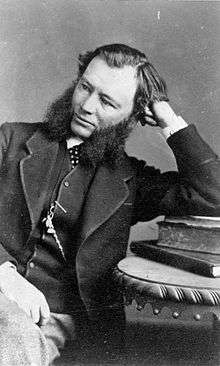Charles Bowen (New Zealand politician)
| The Honourable Sir Charles Christopher Bowen KCMG | |
|---|---|
 Charles Christopher Bowen | |
| 13th Speaker of the Legislative Council | |
|
In office 30 June 1905 – 4 July 1915 | |
| Preceded by | Richard Reeves |
| Succeeded by | Charles John Johnston |
| Personal details | |
| Born |
29 August 1830 County Mayo, Ireland |
| Died |
12 December 1917 (aged 87) Riccarton, Christchurch, New Zealand |
| Political party | Independent |
Sir Charles Christopher Bowen KCMG (29 August 1830 – 12 December 1917) was a New Zealand politician.
Life

Bowen was born in County Mayo, Ireland and studied law for two years at Cambridge University. At the age of 20 he emigrated with his parents on one of the First Four Ships, the Charlotte Jane, to the Canterbury settlement.[1]
His law training led to a position as private secretary to John Robert Godley, founder of the Canterbury colony. He was in charge of the police force, and, together with Crosbie Ward, became a part-owner of the Lyttelton Times newspaper.[2]
In 1859, Bowen traversed the Andes on with Clements Markham, and 16 July 1861, he married his sister Georgina Elizabeth Markham.[1]
Following their return to Christchurch, Bowen was appointed resident magistrate in 1864, succeeding Joseph Brittan, who had resigned on health grounds.[3] Bowen held the position until 1874.
Political career
| Parliament of New Zealand | ||||
| Years | Term | Electorate | Party | |
| 1875 | 5th | Kaiapoi | Independent | |
| 1875–1879 | 6th | Kaiapoi | Independent | |
| 1879–1881 | 7th | Kaiapoi | Independent | |
Bowen started his political career by getting elected to the first Canterbury Provincial Council for the Christchurch Country electorate on 10 September 1853.[4] He served until the end of the first term and then successfully contested the Avon electorate, where he was returned on 6 November 1857. He served on the second to fourth Council representing the Avon electorate until 8 February 1865.[4] He became the council's second Speaker in April 1855 and held that role until February 1865.[5] He served on the Canterbury Executive Council from July to September 1857.[6] He was the Council's first Deputy-Superintendent from September 1857 to September 1862.[7]
Bowen was directly appointed to cabinet (by way of the Legislative Council) on 16 December 1874, but wary of criticism that a public servant had been awarded political office, he resigned from the Legislative Council[8] and stood for election to the House of Representatives in the 22 January 1875 Kaiapoi by-election, following the resignation of John Studholme on 8 December 1874.[1][9] He was confirmed by the Kaiapoi electorate at general elections in 1875 and 1879 and served until the end of the 7th Parliament in 1881, when he retired.[9] From 1874 to 1877, he was Minister of Justice in five successive ministries (first Vogel Ministry, Pollen Ministry, second Vogel Ministry, first and second Atkinson Ministry).[10] Bowen was responsible for the Education Act 1877, which provided for compulsory free, secular primary education.
He was again appointed to the Legislative Council on 20 January 1891 and served until his death on 12 December 1917.[8] He was appointed as one of seven new members (including Harry Atkinson himself) appointed to the Council by the outgoing fourth Atkinson Ministry; a move regarded by Liberals as a stacking of the upper house against the new government.
He was appointed Speaker of the Legislative Council from 1905 to 1915.[11]
Bowen was made a Knight Bachelor in 1910 and a Knight Commander of the Order of St Michael and St George in 1914. He had seven children.[1] He died on 12 December 1917 at his homestead[12] and is buried at the cemetery of St Peter's Church in Upper Riccarton.[13]
Notes
- 1 2 3 4 Lineham, Peter J. "Bowen, Charles Christopher – Biography". Dictionary of New Zealand Biography. Ministry for Culture and Heritage. Retrieved 31 October 2011.
- ↑ "Charles Christopher Bowen". The First Four Ships. Retrieved 31 October 2011.
- ↑ "The Press". The Press. IV (488). 23 May 1864. p. 2. Retrieved 12 September 2012.
- 1 2 Scholefield 1950, p. 192.
- ↑ Scholefield 1950, p. 189.
- ↑ Scholefield 1950, p. 190.
- ↑ Scholefield 1950, p. 188.
- 1 2 Scholefield 1950, p. 74.
- 1 2 Scholefield 1950, p. 96.
- ↑ Scholefield 1950, pp. 35–36.
- ↑ Scholefield 1950, p. 88.
- ↑ "Death of Sir Charles Bowen". The Press. LIII (16083). 13 December 1917. p. 7. Retrieved 19 August 2014.
- ↑ "The Late Sir Charles Bowen". The Press. LIII (16085). 15 December 1917. p. 9. Retrieved 19 August 2014.
References
- Scholefield, Guy (1950) [First ed. published 1913]. New Zealand Parliamentary Record, 1840–1949 (3rd ed.). Wellington: Govt. Printer.
Further reading
| Wikimedia Commons has media related to Charles Christopher Bowen. |
- Mennell, Philip (1892). "
 Bowen, Hon. Charles Christopher". The Dictionary of Australasian Biography. London: Hutchinson & Co. Wikisource
Bowen, Hon. Charles Christopher". The Dictionary of Australasian Biography. London: Hutchinson & Co. Wikisource
| Political offices | ||
|---|---|---|
| Preceded by Maurice O'Rorke |
Minister of Justice 1874–1877 |
Succeeded by John Sheehan |
| Preceded by Richard Reeves |
Speaker of the New Zealand Legislative Council 1905–1915 |
Succeeded by Charles John Johnston |
| New Zealand Parliament | ||
| Preceded by John Studholme |
Member of Parliament for Kaiapoi 1875–1881 |
Succeeded by Isaac Wilson |